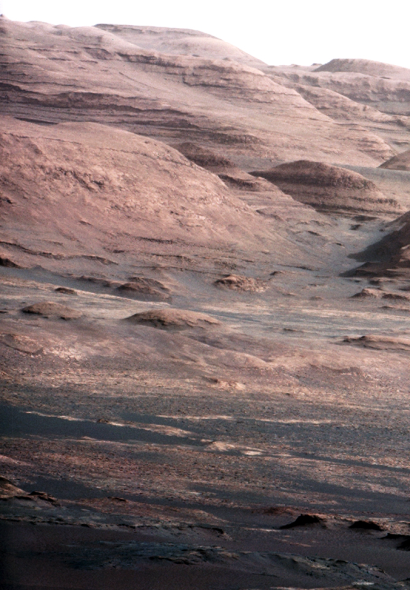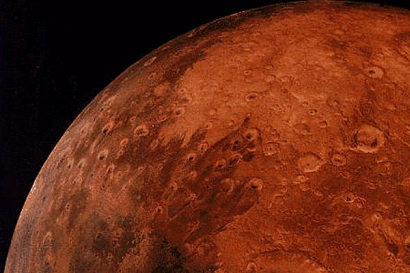
Photo of Mars, sent back by Curiosity
and seen by human
eyes for
the first time - as far as we know - on Sept. 3. Can
humanity pull itself together
and
colonize the solar system?
[Click
Here for Gallery of Mars Images from Curiosity]
In the Name of Money or
National Prestige, Mars will be Colonized (Opera Mundi, Brazil)
"The new space
race is a reality, and reflects a multipolar trend in
the planet’s geopolitics (still only the Earth's): Russia, China and India have
made significant investments in their space programs, and soon plan to send
unmanned artifacts to Mars. ... such a mission would stimulate legions of young
people who will again be interested in the study of the sciences ... and there
is the likelihood of getting hold of significant mineral reserves, such as
iron, nickel, lead, silver and copper, all present in the Martian soil."
By Pedro Chadarevian*
Translated By Brandi Miller
September 5, 2012
Brazil
- Opera Mundi - Original Article (Portuguese)
The worsening global economic crisis has pushed results of
the most recent space missions in the solar system into the background. Nevertheless,
the importance of these missions has an impact in terms of the consolidation of the current and future great powers, as well the
scientific discoveries that could completely alter our understanding of the
origin and development of life on our planet.
The human colonization of other planets was a much more
serious theme several decades ago, when traveling to the moon left the realm of
science fiction and became an almost banal fact. At the time, however, the
absence of attractive economic and scientific inducements on our only satellite
gradually reduced lunar missions until they were completely ended in the 1990s.
The announcement of the existence of life on Mars seems only
a question of time, and will have a striking effect on a new era of space missions,
now supported by the most cutting-edge technology that will make the pioneering
astronauts of the 20th century look like amateurs.

The main centers of research openly admit this
hypothesis, despite emphatically dismissing the possibility of finding
highly-evolved intelligent life and civilizations on the Red Planet - a
controversy fed by ufologists based on thousands of images of Mars' surface
that are now available. [One of the most controversial - the "face"
on Cydonia, from the 1976 Viking Mission, left].
Controversies aside, there is already a consensus, thanks
to information obtained by radar satellites orbiting our neighboring planet, about
the presence of water, though probably only in the subsoil or frozen in its
polar ice caps. Furthermore, the presence of methane detected in the Martian
atmosphere points to the possibility of organic life - the main source of this
gas on Earth.
Apart from sheer scientific interest and human curiosity about
studying the geological and natural history of Mars and the origins of life on
Earth, what could justify a manned mission to the Red Planet? An official
project to colonize the planet remains absent from the stated objectives of the
major space agencies, both European (European Space Agency)
and North American (National
Aeronautics and Space Administration).
However, important U.S. lobbies have emerged to try and
resume manned missions and the “conquest of space.” The National
Space Society and the Mars
Society, for example, are non-governmental organizations composed of
experienced scientists with revolutionary designs, and in theory, feasible
projects form putting in place colonies on Mars starting in 2030.
Like
Worldmeets.US on Facebook

Mars:
Destined to be humanity's second home?
The argument of Martian lobbyists raises two
key justifications for the venture, the first of which is symbolic in nature:
the need to reassert U.S. technological supremacy. The new space race is a
reality, and reflects a multipolar trend in the planet’s geopolitics (still only
the Earth's): Russia, China and India have made significant investments in
their space programs, and soon plan to send unmanned artifacts to Mars.
However, scientific journals consider the U.S. and Europe at least 50 years
ahead of these new emerging powers.
But beyond the symbolic impact of the pioneering conquest
of the Red Planet, the economic impact of manned missions to Mars are more
compelling, and may be even more convincing to Washington Congressmen.
On the one hand, such a mission would stimulate legions
of young people who will again be interested in the study of the sciences, as occurred
at the beginning of the Cold War. Years later, this resulted in the computer
revolution led by the United States.
One the other, there is the likelihood of getting hold of
significant mineral reserves, such as iron, nickel, lead, silver and copper, all
present in the Martian soil, and access to sources of water that is becoming gradually
scarcer on Earth.
While there is also clear scientific interest in this
type of mission, there are potential elements that are impossible to quantify
in economic terms, such as the possibility of discovering that we are not alone
in the universe, which would reinforce a hypothesis that is controversial today
about the concomitant emergence of life on several worlds; or the possibility that
the Martian climate was once similar to Earth's, which would offer clues about
the evolution of our planet's climate.
SEE ALSO ON THIS:
Le Temps, Switzerland: Honor Neil Armstrong: Let Us Begin a Manned Mars Mission 'Now'
NRC Handelsblad, The Netherlands: Travel To Moon and Stars is What Humanity Needs
The Straits Times, Malaysia: Beijing Calls Space Arms Race a 'Historic Inevitability'
El Mundo, Spain: The Iron Grip of the U.S. 'Nuclear-Space Industrial Complex'
Tribune de Geneve, Switzerland: The Moon and the Chinese; Mars and America
Novosti, Russia: With Shuttle Launch, America Risks Its Image - and Its Astronauts
Novosti, Russia: Another Visit to Mars; 'It's the Americans Again'
Nachrichten, Switzerland: Climate Change Solution: Shoot Cheney into Space
Korean Central News, North Korea: The United States Seeks 'Monopoly of Outer Space'
Nevertheless, serious obstacles have delayed manned
missions to Mars. The first is the NASA privatization program implemented
under President Obama. The pressure to cut costs and outsource part of the
investment in space exploration to the private sector undermines hopes of resuming
the manned missions beyond Earth orbit that were announced at the beginning of
the 1990s.
Posted by Worldmeets.US
Before its restructuring, NASA began to prioritize the
use of robots for space exploration, which are no less sophisticated. The last
of these intelligent machines remotely controlled from the Earth, Curiosity,
landed on Mars at the beginning of August at the base of Mount Sharp [cost of
the project: $2.5 billion]. The excitement this triggered on social networks,
where the robot has its own profile and periodically sends back high resolution
images from the incredible Mars rover, has exceeded all expectations,
lending added legitimacy to those who argue that the public would accept the
huge investments required for space research. If advertising is indeed the soul
of business, we might consider, and this is no exaggeration, that this is a "first
giant leap" toward a new scientific revolution for humanity: the
colonization of other planets.
*Pedro Chadarevian has
a doctorate in Economics from the University of Paris, is a professor of
Economics at the Federal University of São Carlos and is the editor of the blog
Outra Economica [Other Economy]. He writes every other week for Opera Mundi.
YOUR DONATION MAKES OUR WORK AS
A NON-PROFIT POSSIBLE. THANK YOU.